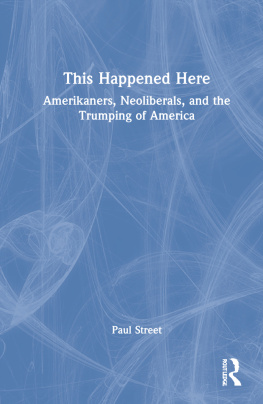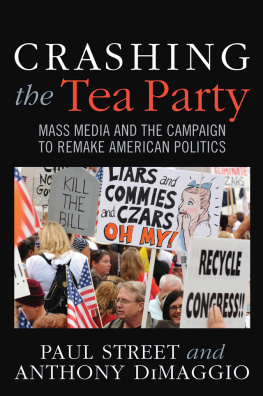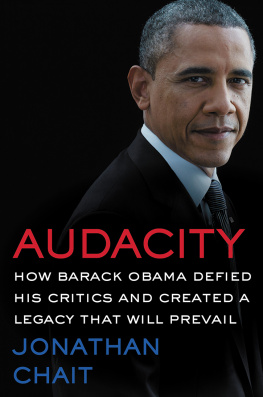First published 2010 by Paradigm Publishers
Published 2016 by Routledge
2 Park Square, Milton Park, Abingdon, Oxon OX14 4RN
711 Third Avenue, New York, NY 10017, USA
Routledge is an imprint of the Taylor & Francis Group, an informa business
Copyright 2010 , Taylor & Francis.
All rights reserved. No part of this book may be reprinted or reproduced or utilised in any form or by any electronic, mechanical, or other means, now known or hereafter invented, including photocopying and recording, or in any information storage or retrieval system, without permission in writing from the publishers.
Notice:
Product or corporate names may be trademarks or registered trademarks, and are used only for identification and explanation without intent to infringe.
Library of Congress Cataloging-in-Publication Data
Street, Paul Louis.
The empires new clothes : Barack Obama in the real world of power / Paul Street.
p. cm.
Includes bibliographical references and index.
ISBN 978-1-59451-844-7 (hardcover : alk. paper) ISBN 978-1-59451-845-4 (pbk. : alk. paper)
1. United StatesPolitics and government2009 2. United StatesForeign relations2009 3. Obama, Barack. I. Title.
E907.S74 2010
973.932092dc22
2010014744
ISBN 13: 978-1-59451-844-7 (hbk)
ISBN 13: 978-1-59451-845-4 (pbk)
Barack Obama is a brand. And the Obama brand is designed to make us feel good about our government while corporate overlords loot the Treasury, our elected officials continue to have their palms greased by armies of corporate lobbyists, our corporate media diverts us with gossip and trivia and our imperial wars expand in the Middle East. Brand Obama is about being happy consumers. We are entertained. We feel hopeful. We like our president. We believe he is like us. But like all branded products spun out from the manipulative world of corporate advertising, we are being duped into doing and supporting a lot of things that are not in our interest.
President Obama does one thing and Brand Obama gets you to believe another. This is the essence of successful advertising.
Chris Hedges, May 3, 20091
One benefit of the Obama presidency is that it is validating much of George W. Bushs security agenda and foreign policy merely by dint of autobiographical rebranding [and with] artfully repackaged versions of themes President Bush sounded with his freedom agenda. We mean that as a compliment
Wall Street Journal editors, Barack Hussein Bush, June 5, 20092
Like Bushs America, Obamas America is run by some very dangerous people.
John Pilger, October 14, 20093
As Obama came into office, Condoleezza Rice predicted that he would follow the policies of Bushs second term, and thats pretty much whats happened apart from a different rhetoric and style. But it wise to attend to deeds, not rhetoric. Deeds commonly tell a different story.
Noam Chomsky, London, November 20094
The U.S. has a machine that spans the globe, that has the capacity to kill, and Obama has kept it set on kill.
Allan Nairn, January 6, 20105
. Chris Hedges, Buying Brand Obama, Truthdig (May 3, 2009), read at http://www.truthdig.com/ report/item/20090503_buying_brand_obama.
. Wall Street Journal, December 5, 2009, read at http://online.wsj.com/article/SB1244161097922 87285.html.
. John Pilger, Media Lies and the Ware Drive Against Iran, October 14 2009, read at http://www.johnpilger.com.
. Common Dreams, November 9, 2009.
. Allan Nairn, Obama Has Kept the Machine Set on KillJournalist and Activist Allan Nairn Reviews Obamas First Year in Office, Democracy Now (January 6, 2010), read transcript at http://www.democracynow.org/2010/1/6/obama_has_kept_the_machine_set.

In my 2008 book, Barack Obama and the Future of American Politics, I observed that every four years millions of Americans invest their hopes in an electoral process that does not deserve their trust. These citizens qua voters hope that a savior or at least a more effective manager can be installed in the White Housesomeone who will raise wages, roll back war and militarism, provide universal and adequate health care, rebuild the nations infrastructure, produce high-paying jobs, fix the environmental crisis, reduce inequality, guarantee economic security, and generally make daily life more livable. But these dreams are regularly drowned in the icy waters of historical and political reality. In the actuality of American politics and policy, the officially electable candidates are vetted in advance by what Laurence Shoup calls the hidden primary of the ruling class. By prior establishment selection, all of the viable presidential contenders are closely tied to corporate and military-imperial power in numerous and interrelated ways. They run safely within the narrow ideological and policy parameters set by those who rule behind the scenes to make sure that the rich and privileged continue to be the leading beneficiaries of the American system. In presidential as in other elections, U.S. democracy is at best a guided one; at worst it is a corrupt farce, amounting to manipulation, with the larger population the project of propaganda in a controlled and trivialized electoral process. It is an illusion, Laurence Shoup claims (correctly, in my opinion), that real change can ever come from electing a different ruling class-sponsored candidate.
This is especially true in the corporate-neoliberal era, We might add that American political culture has also long observed narrow parameters of permissible debate and action surrounding skin color and sex typebarriers that have generally prevented leading politicians and officeholders from seriously attacking underlying structures and patterns of racial and gender disparity.
Throughout the century in which Hofstader wrote and into the present one, Howard Zinn noted, We have seen exactly the same limited vision Hofstader talked abouta capitalist encouragement of enormous fortunes alongside desperate poverty, a nationalistic acceptance of war and preparation for war. Government power swung from Republicans to Democrats and back again, but neither party showed itself capable of going beyond that vision.
Hofstaders and Zinns observations remain strikingly relevant to a Barack Obama presidency that is one year in the making as I write today. Obamas careful, business-friendly handling of the economy (strong on bailouts for giant financial institutions and weak on support for the growing mass of unemployed and poor), the weakening of his health reform to a corporation-serving shadow of its original progressive promise, the passage of a record-setting Pentagon budget, and the related significant escalation of U.S. military violence in Afghanistan, Pakistan, Yemen, and Somalia are just some of the many indications (detailed in the chapters that follow) of how deeply beholden Obama is to existing dominant domestic and global hierarchies and doctrines.












